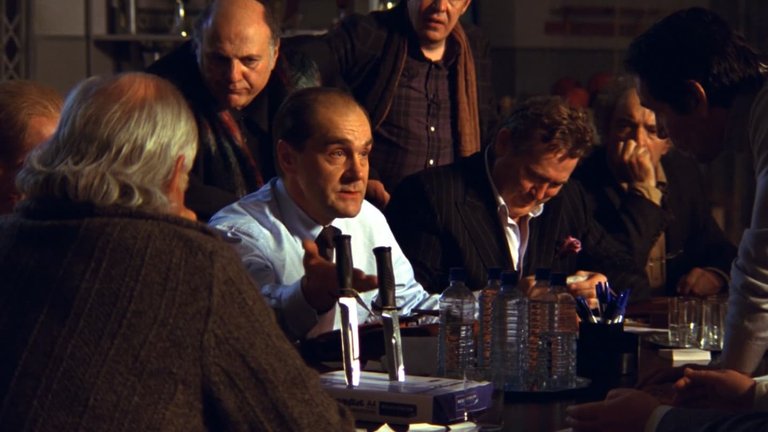
Of all the grand classics of 20th-century cinema, 12 Angry Men stands out as perhaps the most quintessentially American film. Its portrayal of a jury deliberating over a murder trial encapsulates the ideals that distinguish the United States from other nations—principles such as the presumption of innocence, equality before the law, and the moral obligation to confront personal biases in pursuit of justice. The film serves as a powerful reminder of what Americans should strive for in their legal system and societal interactions. However, this iconic work has not been immune to cultural appropriation. A notable example is 12, Russian drama written and directed by Nikita Mikhalkov, which takes the foundational themes of Rose's original teleplay and transposes them into a distinctly Russian milieu.
The plot of 12 closely follows Reginald Rose's original 1954 teleplay but shifts its setting from the United States to contemporary Russia. The film opens at the conclusion of a trial involving a Chechen youth accused of murdering his stepfather, a former Russian Army officer who had served in Chechnya. Due to renovations at the courthouse, twelve jurors are sequestered in a school gymnasium to deliberate the case. Initially, most jurors perceive the trial as an open-and-shut case, expecting a swift guilty verdict that would result in life imprisonment for the accused. However, one juror—a physicist portrayed by Sergei Makovetsky—casts a surprising "not guilty" vote, citing reasonable doubt and advocating for the boy's right to a second chance. This dissent ignites tension among the jurors, particularly with a character played by Sergey Garmash, a far-right nationalist cab driver. As discussions unfold under the watchful eye of a silent foreman (played by Mikhalkov), jurors begin to reveal their personal histories and biases that inform their perspectives on justice.
Mikhalkov’s 12 diverges significantly from Sidney Lumet’s 1957 version, primarily due to the vastly different socio-political landscape of Russia in the 2000s compared to America in the 1950s. The original teleplay emerged during an era marked by McCarthyism and start of civil rights movement, serving as a powerful defence of democracy and work that championed principles like presumption of innocence and equality under law. In contrast, Mikhalkov's film reflects a time when many Russians viewed the introduction of US-style democracy and capitalism during the 1990s as a failed experiment.
In an intriguing twist, Mikhalkov repurposes Rose’s template to advocate for a more cynical view of justice—suggesting that legal processes may be bypassed if alternative means can achieve what is deemed "right." The script introduces a credible alternative to the defendant's guilt by speculating that the father stepped on some powerful oligarch or organized crime toes before being murdered with young Chechen becoming convenient scapegoat. This narrative shift becomes more palatable to the jury when it is revealed that their foreman is actually a former military intelligence officer—a "silovik" well-versed in such matters. His influence ultimately guides his fellow jurors towards what he deems an appropriate verdict.
This thematic pivot has provoked ire among critics within Russia's pro-Western liberal intelligentsia, particularly those who were becoming increasingly disillusioned with Vladimir Putin’s administration at that time. Critics argued that Mikhalkov's portrayal reflected an alarming embrace of authoritarianism; they saw his character as a symbolic stand-in for Putin himself—a "silovik" who embodies state power. Furthermore, two jurors—a liberal television mogul (played by Yuri Stoyanov) and a human rights activist (played by Sergey Artisbashev)—are depicted unfavourably, drawing parallels with real-life critics of Putin. This portrayal has led some viewers to interpret Mikhalkov’s work as an endorsement of political apathy towards legality in favour of pragmatic outcomes.
Despite its contentious political implications, 12 offers valuable insights into contemporary Russian society, highlighting its diversity and internal divisions along lines of class, education, political ideology, and ethnicity. Two characters—an elderly Jew (played by Valentin Gaft) who endured persecution during World War II and an Armenian surgeon (played by Sergey Gazarov), who, being from Caucasus, understands young Chechen better than anyone else—provide unique perspectives that enrich the jury's deliberations. Their contributions echo Lumet’s classic approach by allowing a formidable ensemble cast to shine through diverse yet challenging roles.
Mikhalkov had previously, during Yeltsin’s era, garnered much acclaim at the West for his critique of Stalinism in Oscar-winning period drama Burnt by the Sun; this reputation helped him avoid scrutiny with 12. The film premiered at the Venice Film Festival where it won the Special Golden Lion and later received national accolades in Russia after being praised by Putin himself.
From a strictly technical standpoint, 12 does not quite measure up to Lumet's masterful execution. Lumet’s version unfolds in real time with simplicity and clarity; conversely, Mikhalkov's adaptation feels overlong at times. Some performances veer towards melodrama while certain poetic sequences—such as flashbacks depicting Chechen wars—may confuse audiences.
While 12 cannot match the brilliance of 12 Angry Men, it is a worthy adaptation that explores the complexities of modern Russia. Its brave and original approach to the source material, coupled with exceptional acting performances, make it a film worth watching.
RATING: 6/10 (++)
Blog in Croatian https://draxblog.com
Blog in English https://draxreview.wordpress.com/
InLeo blog https://inleo.io/@drax.leo
Hiveonboard: https://hiveonboard.com?ref=drax
Rising Star game: https://www.risingstargame.com?referrer=drax
1Inch: https://1inch.exchange/#/r/0x83823d8CCB74F828148258BB4457642124b1328e
BTC donations: 1EWxiMiP6iiG9rger3NuUSd6HByaxQWafG
ETH donations: 0xB305F144323b99e6f8b1d66f5D7DE78B498C32A7
BCH donations: qpvxw0jax79lhmvlgcldkzpqanf03r9cjv8y6gtmk9
Posted Using InLeo Alpha


